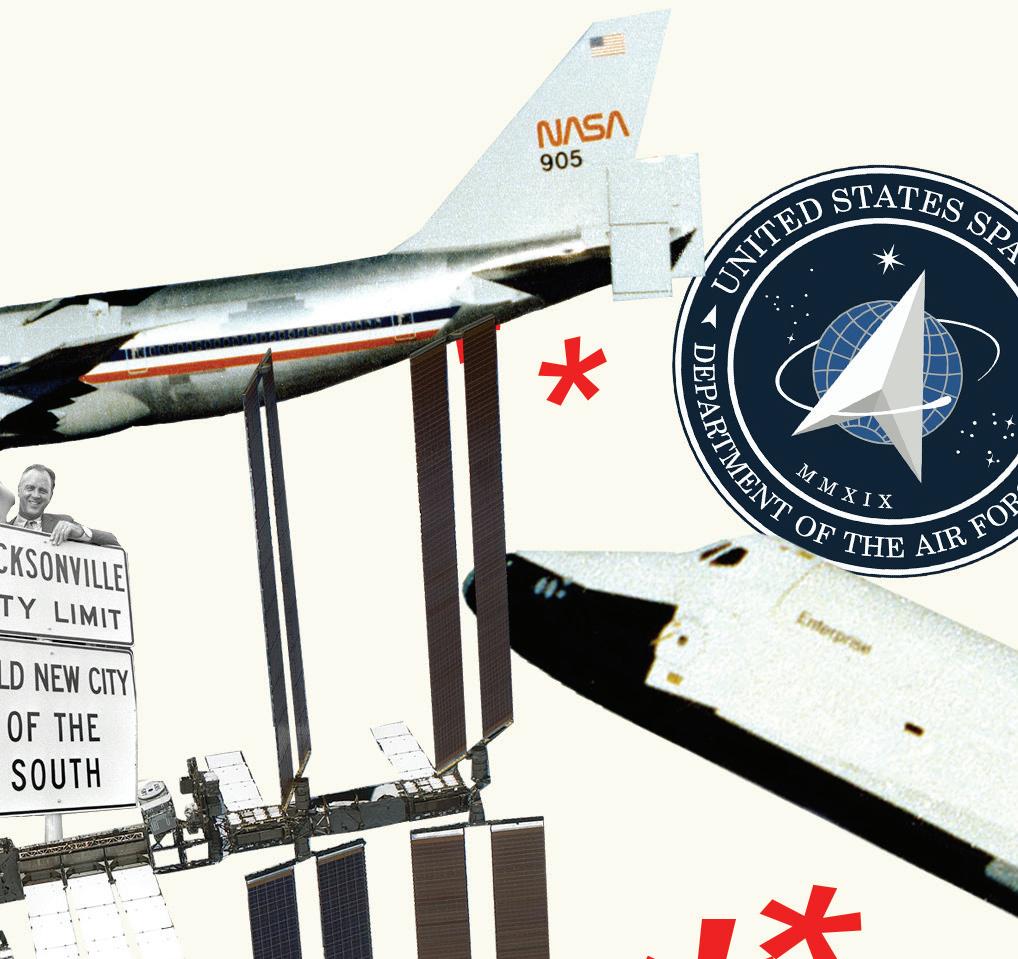
3 minute read
One giant leap for Jacksonville
* ONE GIANT LEAP FOR JACKSONVILLE WILL TRUMP’S SPACE FORCE CHOOSE JACKSONVILLE AS ITS FIRST HOME?




A faint fireball slowly reaches into the stratosphere, followed by a long, thin plume of white smoke. When the burning light in the sky went out and the smoke cleared, cheers and applause echoed across the horizon. For Floridians, NASA shuttle launches were a celebrated pasttime statewide: crowds would gather to watch from the launch site in Cape Canaveral to all across the west coast. But, in 2011, the Space Shuttle program folded, ending an era spanning over three decades.
With recent developments, fans of the cosmos may have a new hope: the US launched the newly-independently operating military branch, the Space Force, whose main objective is to command the high-skies - and explore the final frontier. The space-warfare service branch is seeking a new city to call home, and several cities in Florida made the first cut, including Jacksonville. To be considered to host the Space Force, a city must be within 25 miles of a military installation, score at least a 50 on the AARP’s Livability index, and be within the top 150 Metropolitan Statistical areas in the country. Duval meets all of these qualifications, with two Naval stations and being the largest city by land area in the continental US. Being in relative close proximity to the Kennedy Space Center, the River City is likely a top contender.
Gov. Ron DeSantis, who claims “these installations provide great support to our national defense and provide a significant economic impact to our state,” and Mayor Lenny Curry agrees. “Having this important command headquartered in our city would generate a significant economic impact for Northeast Florida and the State as a whole,” Curry told WJCT News.
Though this may sound great and Jacksonville has strong potential for the Space Force, several critics say the concept is a failure to launch. The military branch requested $15 billion for its first budget request, which is steep for a new branch with few set-plans or organization. Additionally, there has been criticism of corporate involvement with the Space Force, drawing comparisons to private rocket companies personally endorsed by President Trump, such as Amazon CEO Jeff Bezo’s Blue Origin and Tesla titan Elon Musk’s SpaceX, which recently began launching rockets.
Musk’s use of the small community of Boca Chica, Texas has been met with sharp yet hushed criticism. Before SpaceX set up camp there, Boca Chica was a quiet, quaint town predominantly made up of retirees. Since then, the launch site has increased over seven times its original size, slowly encroaching on the town. Residents complain of excessive noise, explosions, and fear their homes and lives are at risk. Recently, SpaceX has delivered letters to homes warning of upcoming launch tests that put their windows at risk of shattering. Despite the longstanding community being inhabited, Musk nonchalantly claimed “We got a lot of land with nobody around, so if it (a rocket) blows up, it’s cool.” Could the impact of SpaceX on Boca Chica be an omen? Possibly, given the lack of regard for citizens and townships by privatized space companies, such as SpaceX. The rural land, small population, and lack of social mobility and platform these residents have created a vacuum for SpaceX to do as it pleases, should they settle on the area. But this poses more gray areas as well. If the Space Force is to call Duval home, it absolutely should not displace people, put people of lower-socioeconomic status at risk, or create any serious hazards, as SpaceX has in Boca Chica. As the Space Force is still in its infantile stages, there’s a lot left to the imagination. The Space Force remains a giant leap for Jacksonville, the question is: will we land on our feet? CASEY CRAIG STORIES@FOLIOWEEKLY.COM










